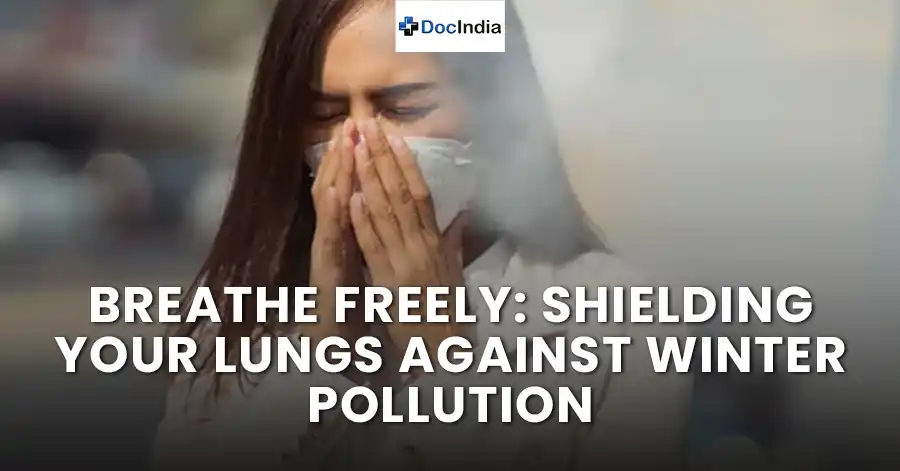Breathe Freely: Shielding Your Lungs Against Winter Pollution

Winter Pneumonia Management: 7 Tips To Protect Your Lungs From The Hidden Impacts of Air Pollution
As winter envelopes us in its cold embrace, the threat of air pollution silently pervades the air we breathe, significantly impacting our respiratory health. Unseen and often underestimated, air pollution poses a substantial risk to lung health, necessitating a deeper understanding of its insidious effects.
The Relationship Between Air Pollution and Pneumonia
Air pollution, comprised of a cocktail of gases, particulate matter, and chemicals, plays a pivotal role in compromising lung health. Key associations between air pollution and pneumonia shed light on the severity of its impact:
- Immune System Vulnerability: Pollutants like nitrogen dioxide and sulfur dioxide can compromise the body's immune defenses, making individuals more susceptible to contracting pneumonia.
- Heightened Lung Cancer Risk: Prolonged exposure to polluted air triggers persistent inflammation and tissue damage, elevating the risk of developing lung cancer over time.
- Indoor Air Quality Implications: Indoor air pollution sources, including cigarette smoke, cooking fumes, and household chemicals, significantly contribute to the development of lung cancer and exacerbate respiratory issues.
7 Tips To Protect Your Lungs From Winter Air Pollution
Protecting your lungs from the perils of winter air pollution is crucial for maintaining optimal respiratory health. As pollution levels fluctuate during this season, adopting strategic measures becomes paramount to safeguarding your lungs from the harmful effects of environmental pollutants.
1. Limit Outdoor Activities During High Pollution Periods
When pollution levels spike, restricting outdoor physical activities serves as a primary defense against inhaling harmful pollutants. By minimizing exposure to polluted air, you significantly reduce the risk of respiratory complications, thus safeguarding lung health.
2. Manage Indoor Air Quality
Ensuring superior indoor air quality is pivotal in protecting your lungs from the adverse effects of pollution. Strategies such as reducing the use of chemical cleaners, promoting natural ventilation, and employing air purifiers effectively mitigate exposure to indoor pollutants. These measures create a sanctuary within your home, shielding your respiratory system from harmful particles present in the air.
3. Use Masks as a Protective Barrier
Donning masks when stepping outdoors during periods of poor air quality serves as a vital shield against inhaling harmful pollutants. This simple yet effective measure provides a protective barrier for your respiratory system, minimizing the intake of pollutants that can compromise lung health.
4. Embrace Healthy Lifestyle Choices
Engaging in deep breathing exercises, maintaining a balanced diet, and sticking to regular exercise routines play a pivotal role in fortifying lung health. These lifestyle choices bolster your body's resilience against the adverse effects of air pollution, enhancing lung function and mitigating the impact of environmental pollutants.
5. Quit Smoking for Optimal Lung Health
Quitting smoking remains a cornerstone in preserving optimal lung health. Smoking significantly increases the risk of respiratory complications and lung-related diseases. By quitting this habit, you take a crucial step toward protecting your lungs from further damage caused by pollutants present in the air.
6. Maintain Clean Environments
Creating and sustaining clean living spaces is essential for protecting lung health. Minimizing dust, molds, and pet dander in your home substantially enhances indoor air quality, providing a protective shield for your lungs against harmful pollutants.
7. Proactive Measures for Lung Health
Adopting proactive measures empowers individuals to actively safeguard their lung health amidst escalating air pollution levels. By following these recommended strategies consistently, you significantly reduce the risks posed by environmental factors, fortifying your respiratory system against the detrimental effects of pollution.
Safeguarding your lungs from the impact of winter air pollution involves a multi-faceted approach. By limiting outdoor activities during high pollution periods, managing indoor air quality, using protective masks, embracing healthy lifestyle choices, quitting smoking, maintaining clean environments, and adopting proactive measures, you can effectively protect your respiratory health. These strategies serve as pillars of defense against the hidden dangers posed by air pollution, ensuring that your lungs remain resilient and healthy despite the challenges posed by environmental pollutants during the winter season.
In summary, winter’s icy grasp not only brings seasonal delights but also harbors hidden dangers to lung health through air pollution. Recognizing the silent assault of air pollution on our respiratory systems and implementing these proactive measures is crucial. These efforts significantly mitigate the detrimental effects of air pollution, ensuring the protection of our lungs and the maintenance of optimal health, even amid escalating pollution levels.
